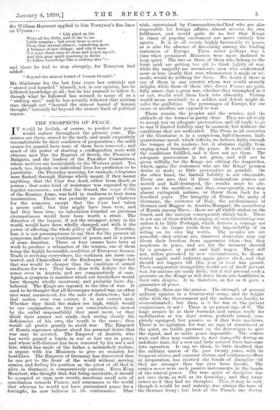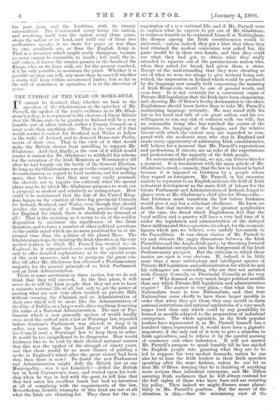THE PROSPECTS OF PEACE.
IT would be foolish, of course, to predict that peace would endure throughout the present year. The armies are there, armed to the teeth, and made exquisitely uncomfortable by their condition of preparation ; the solid causes for quarrel have none of them been removed ; and much of the power of starting a conflagration rests with obscure men like the Regents of .Servia, the Premier of Bulgaria, and the leaders of the Pan-Slav Committees, whose motives are incalculable to the Western mind. Too much, too, depends on individual lives for prediction to be justifiable. On Thursday morning, for example, telegrams were flashed through Europe which meant, if they meant anything, that the Czar was dead, either from shock or poison ; that some kind of resistance was expected to the regular succession ; and that the Guard, the corps d' elite of the Russian Army, was held in readiness to beat down insurrection. There was probably no ground whatever for the rumours, except that the Czar had taken a severe cold ; but they might have been true, and had they been true, no calculation founded on previous circumstances would have been worth a straw. The direction of the largest, if not the strongest Army in the world, would have been wholly changed, and with it the power of affecting the whole policy of Europe. Neverthe- less, it is not presumptuous to say that for the present all symptoms indicate a continuance of peace, and of a peace of some duration. Three or four causes have been at work to produce a relaxation of the tension, one of them being the highly favourable condition of European finance. Trade is reviving everywhere, the workmen are more con- tented, and Chancellors of the Exchequer no longer feel that war would be cheaper than the condition of armed readiness for war. They have done with deficits for the nonce even in Austria, and are comparatively at ease. Again, a symptom is manifest which our forefathers would have thought wholly unnatural, and probably have dis- believed. The Kings are opposed to the idea of war. It used to be thought that all Sovereigns wanted war, as other men want amusement, for the sake of distraction ; but if that notion ever was correct, it is not correct now.
Whether they think the stakes too high, which would be our explanation, or they are conscientiously moved by the awful responsibility they must incur, or they think their armies not ready, each seeing clearly the deficiencies of his own, the result is the same ; they would all prefer greatly to avoid war. The Emperor of Russia expresses almost aloud his personal desire that war may be averted. The Emperor of Austria, who has never gained a battle in war or lost one in peace, and whose self-distrust has been renewed by his son's sad fate, which has made of the father a melancholy recluse, is uraent with his Ministers to give no occasion for hostilities. The Emperor of Germany has discovered that he can get to the front of the world without moving armies, and feeling his position as the pivot of all that is alive in Germany, is comparatively content. Even King Humbert, who thought that, war being inevitable, it should be accepted at once, now recoils, sanctions small acts of conciliation towards France, and announces to the world that whereas he would not have guaranteed peace for a fortnight, he now believes in its continuance. That wish, entertained by Commanders-in-Chief who are also responsible for foreign affairs, almost secures its own fulfilment, and would quite do so, but that Kings in times of popular excitement are never entirely free agents. It is at all events highly favourable to peace, as is also the absence of fire-eating among the leading statesmen of Europe. There never perhaps was a time when prominent Ministers were more inclined to keep quiet. The two or three of them who belong to the front rank are getting too old to think lightly of war, while the majority are second-rate men who understand more or less clearly that war, whomsoever it made or un- made, would do nothing for them. We doubt if there is one of them in any country whom war would secretly delight, while those of them who direct France are pain- fully aware that a great war, whether they triumphed in it or not, would send them back into obscurity. Victory would mean servitude to a soldier, and defeat might in- volve the guillotine. The personages of Europe, for one cause or another; are opposed to war.
There remain the peoples and the armies, and the attitude of the former is pretty clear. They are all ready to accept war on adequate provocation, and all ready to go to war if limited liability may be assured; but without the conditions they are undecided. The Press in all countries of the Continent is in a suspicious, half-timorous, half- quarrelsome mood, which reflects, we believe, fairly enough the temper of its readers ; but it abstains rigidly from urging actual breaches of the peace. It waits till it sees the conditions fulfilled, and it does not see them. The adequate provocation is not given, and will not be given wilfully, for the Kings are editing the despatches, which, again, the statesmen who are the Kings' penmen desire to make as little provocative as possible. On the other hand, the limited liability is not obtainable. Every one sees that if these tremendous armies are moved and half-destroyed, the results must be ade- quate to the sacrifices ; and that, consequently, war may almost extinguish nations, or throw them back for a hundred years. The integrity of France, the unity of Germany, the existence of Italy, the predominance of German and Magyar in Austria-Hungary, the ascendency of Russia among Slays,—these are all visible stakes on the board, and the nations consequently shrink back. There is not one of them which is urging or even threatening war, unless it be little Portugal, which derives a courage not given to its larger rivals from the impossibility of its acting on its own big words. The peoples are not peaceful—they seldom are, whatever democrats may say about their freedom from aggressive ideas—but they acquiesce in peace, and are for the moment cheered by a prospect of profit and high wages. They will not, unless provoked by new circumstances, be discon tented again until industry again grows slack, and that should not happen till this year at least has passed. Their comparative tranquillity would not of itself prevent war, for nations are easily fired ; but it will prevent such a pressure on the Kings as will force them into hostilities in their own despite. It is, therefore, as far as it goes, a guarantee of peace.
Finally, there are the armies. The strength of general military opinion in a Continental army, and its weight alike with the Government and the nation, can hardly be over-estimated ; but then, is it for war in the present conjuncture, or not ? There is no patent sign of it. The huge armies lie in their barracks and camps ready for mobilisation at ten days' notice, perfectly armed, com- pletely equipped, but passive as if they were machines.
There is no agitation for war, no sign of resentment at the quiet, no visible pressure on the Sovereigns to give the signal, and so make peace impossible. The armies wait, and they may continue to wait tranquilly during an indefinite time, for a new and little noticed force has come into operation. It can, we think, be little doubted that the military unrest of the past twenty years, with its frequent alertes, and constant alarms, and continuous effort at preparation, has rivetted the bonds of discipline till they are stronger than has ever been known. The armies never were such passive instruments in the hands of the central power. The true spirit of discipline has got into them, as well as its formulas ; and they await orders as if they had no thoughts. This, it may be said, though it would be said untruly, was always the tone of the German Army ; but look at the French one during the past year, and the Austrian, with its twenty nationalities. The Continental army being the nation, and resolving itself into the nation every three years, obeys the nation or its head, and until one of those two authorities speaks, is no more for peace or war than its own standards are, or than the English Army is. That is a situation which might easily disappear, because an army cannot be insensible to insult ; but until the in- sult comes, it leaves the armies passive in the hands of the Kings, who, as we have said, are for the present resolved, if it be only possible, to maintain the peace. Whether it is possible no man can tell, any more than he can tell whether a storm will keep within accustomed limits ; but so far as the will of statesmen is operative, it is in the direction of peace.















































 Previous page
Previous page